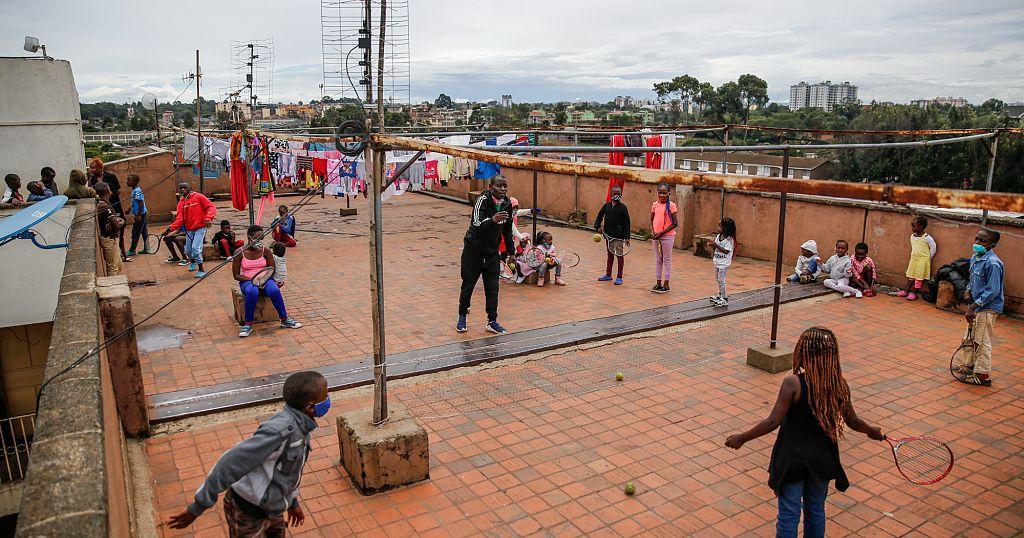Africa-Press – Kenya. They look like any other football, but if you start kicking them around, you can’t help but notice they have a very loud adaptation.
And it’s that which is helping blind and visually-impaired people get back into the ‘beautiful game’.
These “Soundballs” are made at this workshop in Nairobi, supported by non-profit organisation Alive and Kicking.
Martin Bernard, the founder of Alive and Kicking, says it’s important the game is inclusive for everyone.
“Everybody deserves the right to play, even if you can’t see,” says Bernard.
“And I was lucky enough to get the opportunity to work out how to create a ball that when it rolled made a sound so that people who are visually impaired could actually chase around, hear the ball, and have as much fun as kids who are normally sighted.”
The handmade balls are made to a strict standard, according to Bernard.
He says they comply with six out of seven FIFA quality tests, those include rotation and bounce.
But the balls fall short on the water absorption test, he says.
“It’s a completely normal football, the same ball that we make for everybody else,” says Bernard.
“But this one has a set of six devices inside which are made of flat metal, and inside the flat metal, we have a little magic piece of metal, a ball bearing that sounds out against the sources.
“We fold that in against six of the panels, and so when the ball rotates, the ball bearings inside the metal sources make the sound.”
Paralympian Henry Wanyoike is enthusiastic about the project.
He was tipped for stardom in the Olympics, but a stroke in 1995 signalled the start of his blindness.
Since then, he’s won a string of medals in the Paralympics.
Wanyoike believes youngsters should not be locked out of playing games by their disability.
“When we are playing with this ball. And this ball is a sign of hope because it helps us not to be left behind,” he says.
“Before there were only a few sports for people with disability, but now through the innovation of such balls, we are able to bring more on board and we can now have more representation in Paralympics than what was happening before.”
In events, blind runners are tethered to a guide, but this dependence of an athlete on another person can be a serious drawback to their performance.
Wanyoike could have been excluded from the competition if he hadn’t been allowed to switch guides at the Sydney Olympics.
“We are being excluded from having like two guides, (and) because one guide can be a challenge. Like when I was in Sydney, my guide was not feeling well, so I had to get another guide and I almost lost the gold medal,” he says.
Students here at the Thika School for the Blind are already enjoying the Soundball.
Among them is 18-year-old Dennis Gitonga, who lost his sight at the tender age of 14.
Before losing his sight, he had been a competitive footballer.
He says being able to play again is helping him rekindle his love for the game.
“Involving myself in futsal – that is the adapted football – reminds me about my past and makes me feel as if I am included,” says Gitonga.
“I am still included in the normal world even though I have no ability to see, even though I read braille, so I feel included, I enjoy playing football.”
Football in schools is seldom available for visually-impaired students who also face a shortage of trained coaches.
Teachers here at the Thika School welcome the opportunity for their students to play outdoor games.
“Learners with visual impairment, they have very limited games, so if this can be added to the number of games they play, it can be a very good thing for us especially in schools,” says teacher John Kariuki Njeru.
“They like the game, it’s only that we don’t have coaches, we don’t have trainers who can help them to understand the game but when they get in the field, they enjoy the game,” he adds.
To keep costs low, Alive and Kicking uses Kenyan-sourced raw materials.
The initiative is sustained by sales of other products.
And even though economic hardship has adversely affected demand, the group’s vision has managed to stay, as its name suggests: Alive and Kicking.
For More News And Analysis About Kenya Follow Africa-Press






